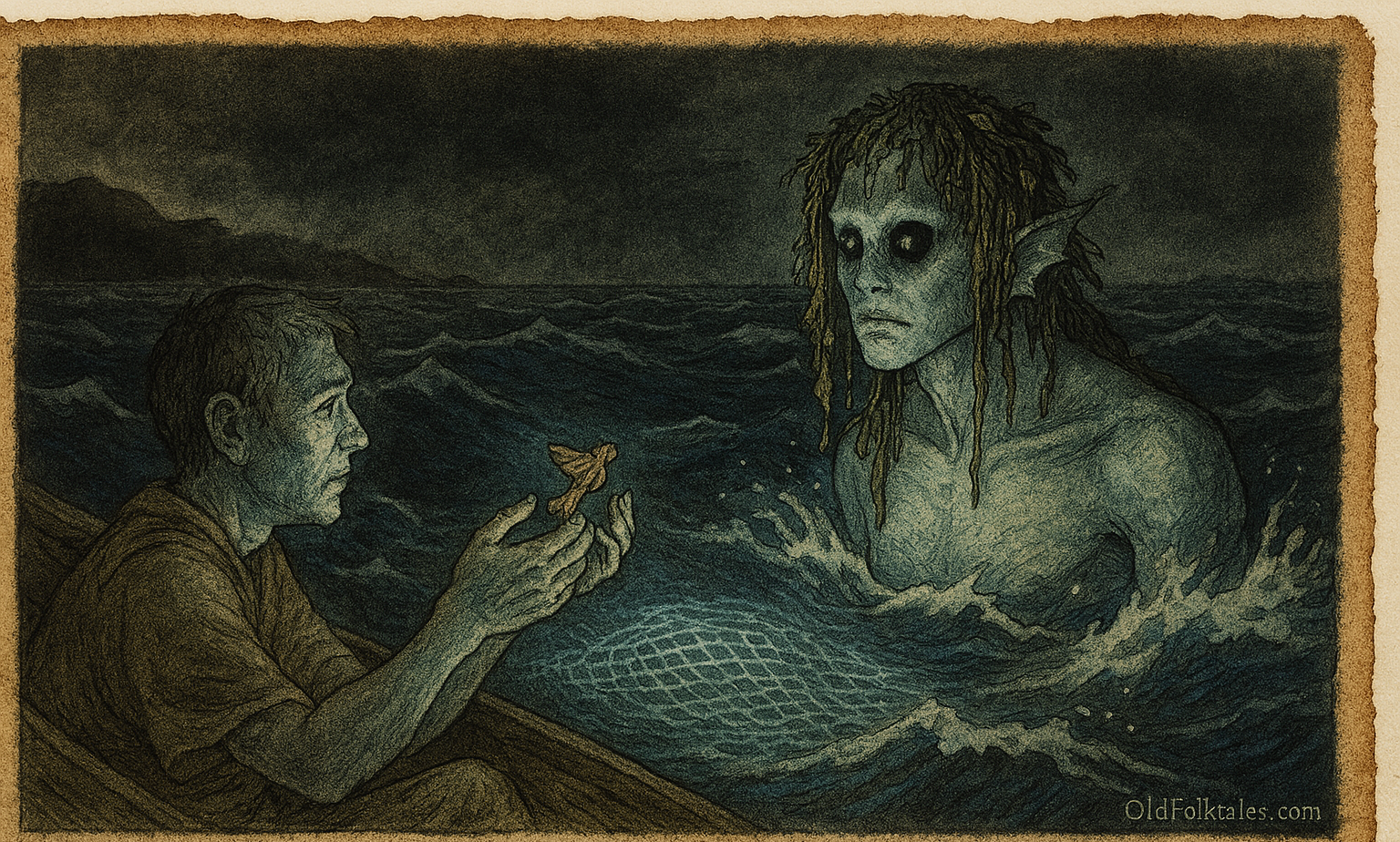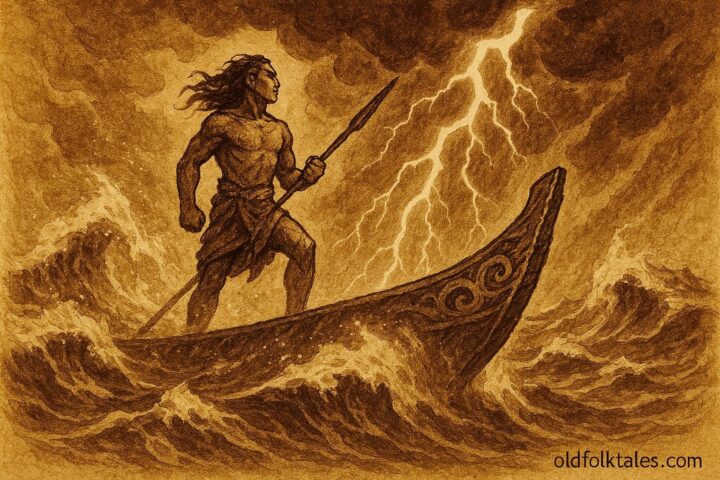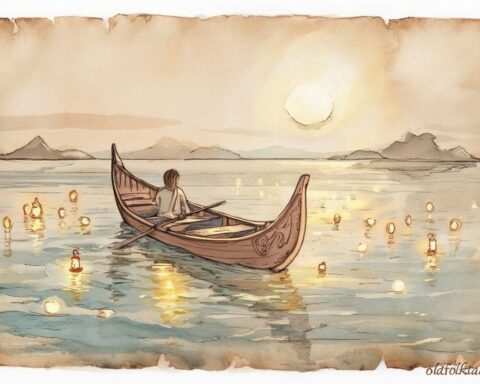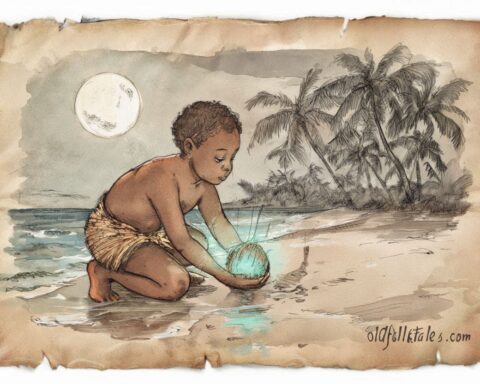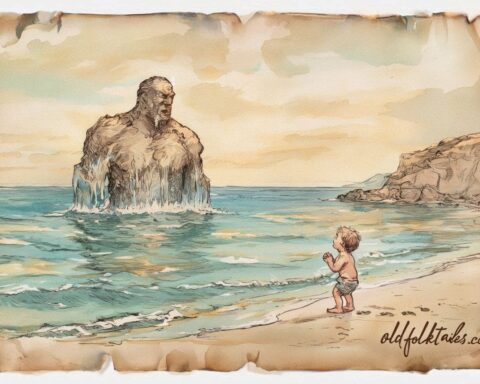There was a fisherman named Tavio who lived where the land met the sea on the island of Makira, where waves rolled in with the patience of eternity and the lagoon shimmered like polished shell. He was renowned throughout the coastal villages for his nets, strong and well-woven, mended with care after each voyage and for the quiet way he nodded to the sea each morning before pushing his canoe into the water.
This greeting was not mere habit but ritual, a gesture of respect passed down through generations of fishermen who understood that the ocean was more than water and salt. It was a living presence, ancient and aware, demanding acknowledgment from those who took from its depths. Tavio honored this tradition faithfully, speaking softly to the waves, thanking them for their bounty, promising never to abuse their generosity.
Click to read all Melanesian Folktales — rich oral storytelling from Papua New Guinea, Fiji, Solomon Islands, and Vanuatu
And the sea, in its mysterious way, responded. Tavio never took more than he needed just enough fish to feed his family, to trade for taro and coconut, to share with widows and elders who could no longer venture onto the water themselves. The lagoon always answered his restraint by spilling fishes into his net, silver bodies flashing in morning light, enough but never excessive, a perfect balance maintained between human need and ocean abundance.
Still, one year when drought touched the island and gardens withered, when many mouths needed feeding and the pressure of community responsibility weighed heavy on strong shoulders, Tavio’s heart turned to worry. He looked at the thin faces of children, heard the crying of babies whose mothers had too little milk, saw how families rationed their meals into smaller and smaller portions. The fish he caught, while sufficient for his own household, seemed pitifully inadequate against the scale of need surrounding him.
On a moonless night, when darkness lay thick upon the water and stars hid behind clouds like shy children, Tavio paddled far from shore. Cold spray touched his face, and salt coated his lips as he worked his net in the traditional way, whispering his customary prayers. The ocean rocked his small canoe with an almost hypnotic rhythm, and in that liminal space between waking and dreaming, he met a stranger on the water.
The figure appeared without warning, without sound of paddle or splash of movement. One moment Tavio was alone; the next, a pale man stood in a canoe alongside his own. The stranger’s skin glowed with a luminescence like moonlight on water, and his eyes were glossy and dark, reflecting nothing eyes that were not quite human, that held depths no mortal gaze could fathom.
“You worry,” the stranger said, his voice carrying easily across the water despite the wind. It was not a question but a statement of fact, as though he had read Tavio’s heart like fishermen read the sky for weather.
Before Tavio could respond, the stranger reached into his own vessel and produced a net that shimmered as if woven from moonlight itself. The strands gleamed with an otherworldly radiance, each knot perfect, each mesh an ideal size for catching fish. The net seemed to pulse with its own life, drawing the eye, promising abundance beyond imagination.
“Take it,” the stranger said, extending the net toward Tavio. “Use it and the sea will not deny you. Fill it as many times as you need, and hunger will flee from your people like darkness before dawn.”
Tavio, tempted beyond his capacity to resist, reached out. His fingers closed around the net, and it felt cool and alive in his hands, humming with potential. The stranger smiled a expression that didn’t quite reach those glossy, inhuman eyes and began to fade back into the darkness. Tavio opened his mouth to speak, to ask the stranger’s name, to inquire about the price of such a gift, but the words caught in his throat. He was afraid that asking might cause the stranger to withdraw the offer, and the faces of hungry children haunted his conscience. So, he remained silent, and the stranger vanished as mysteriously as he had appeared, leaving Tavio alone on the dark water with a net woven from moonlight cradled in his lap.
For three nights, the net filled beyond measure. Tavio would cast it into the lagoon, and before he could complete the traditional prayers, it would grow heavy with fish fat, healthy specimens in numbers he had never seen before. Mullet and trevally, grouper and parrotfish, they poured into his canoe until it rode low in the water, barely able to contain the bounty. His family ate well, their bellies full for the first time in weeks. He distributed fish throughout the village, and little children forgot the ache of empty bellies, their laughter returning like birdsong after a storm.
Tavio told himself this was good, that feeding hungry people justified his acceptance of the mysterious gift. But deep in his heart, beneath the satisfaction of full nets and grateful faces, unease stirred. He had broken protocol. He had taken a gift from a stranger without proper introduction, without offering anything in return, without speaking the necessary words that governed transactions between the human world and the realm of spirits.
On the fourth night, the sea rose in anger. Tavio paddled out as usual, the moonlight net folded carefully in his canoe, but before he could cast it, the water began to churn. Waves that had been gentle swells grew into towering walls of dark water. The wind, which had been a soft breeze, transformed into a howling gale that tore at his hair and clothing. Salt spray blew like a scalding cloth against his face, stinging his eyes, making it difficult to breathe. The waves cowed him back from his usual fishing grounds, pushing his canoe toward shore with a force that suggested barely restrained violence.
Then, rising from the turbulent water like a nightmare given form, the stranger returned. But now he showed his true face, and Tavio’s blood turned cold with recognition and fear. This was no human fisherman offering aid to another. This was an Adaro one of the ancient sea spirits that dwelled in the depths, guardians of ocean boundaries, enforcers of the sacred laws that governed the relationship between land and water.
The Adaro’s gills flared at his neck, opening and closing with each breath, revealing the red flesh within. His pale skin was not the pallor of human illness but the color of deep-sea creatures that never see sunlight. A crown of seaweed adorned his head, dark strands woven with small shells and bits of coral, dripping constantly as though he had just surfaced from profound depths. And where a human heart might beat within a chest, there was instead a hollow a void that suggested something essential had been removed or perhaps had never existed.
“You used a gift without asking the proper words,” the Adaro hissed, his voice like breaking shells, like waves grinding coral into sand. “You took what was offered but gave nothing in return. You spoke no blessing, offered no acknowledgment, asked no permission. The ocean keeps accounts, fisherman, and now payment is due. You must give me one thing in return.”
The water around Tavio’s canoe churned more violently, threatening to capsize the small vessel and drag him down into darkness. Rain began to fall, cold and hard, each drop striking like a small stone. Thunder rumbled in the distance, growing closer with each heartbeat.
Tavio’s mind raced through possibilities. What could he offer that would satisfy a sea spirit? What possession could match the value of three nights of miraculous catches? His nets were ordinary now, worthless to a creature who could weave moonlight. His canoe was old and patched. He had no wealth, no treasure, nothing of obvious value to one who dwelled in ocean depths filled with shipwrecks and ancient hoards.
Then his hand moved almost of its own accord, reaching into his breast, finding the small object that had hung around his neck since birth. He pulled it free and held it up in the storm’s fury: a wooden amulet his grandmother had carved for him the day he entered the world. It was a small bird with a broken wing, carved from driftwood she had found after a great storm, shaped with love and blessed with prayers for his protection and prosperity.
It was the most precious thing he owned, more valuable than any fish, any net, any material possession. It connected him to his grandmother, to his lineage, to the moment of his birth and all the hopes his family had invested in his life. Tears mixed with rain on Tavio’s face as he understood what was required.
“I offer this,” he said, his voice barely audible above the wind. “It is all I have of true value. It was made with love and given with blessing. I offer it freely, and I beg forgiveness for my disrespect.”
He placed the amulet in the sea, releasing it from his fingers and watching it sink into the dark water. For a moment that stretched like eternity, nothing happened. Then the Adaro reached down with fingers webbed and pale, retrieved the amulet, and examined it with those glossy, inhuman eyes.
Something shifted in the spirit’s expression not quite softening, for creatures of the deep do not soften, but perhaps acknowledging the weight of the sacrifice. With a curl of water, with a gesture as graceful as it was powerful, the Adaro caused the storm to calm. The waves settled back into gentle swells. The wind died to a whisper. The rain ceased as though a tap had been turned off. The ocean became glass-smooth once more, reflecting the stars that had emerged from behind retreating clouds.
“Remember this lesson,” the Adaro said, his voice no longer harsh but carrying the weight of ancient authority. “The ocean keeps accounts with names, offerings, and words. Every gift requires acknowledgment. Every taking demands giving. Every blessing must be spoken aloud.” Then he sank beneath the surface, taking the moonlight net with him, leaving Tavio alone on the calm water with only his ordinary net and a heart full of understanding.
From that time forward, whenever Tavio set his net, he first cupped his palms together, breathed deeply of the salt air, and spoke a blessing to the Adaro and to the ocean itself. He named the spirit respectfully, offered thanks for the abundance of the sea, and promised to take only what was needed and no more. He never forgot the price of his presumption, never forgot the grandmother’s amulet that now rested somewhere in the depths as payment for his error.
And though his catches were never again miraculous, though he never again filled his canoe beyond capacity, the sea provided. It gave enough for his family, enough to share with those in need, enough to sustain the balance between human life and ocean abundance. The fish came when he called them with respect, stayed away when he grew greedy in heart, taught him through their presence or absence the great lesson the Adaro had burned into his soul.
So the people of Makira say to this day: the ocean keeps accounts with names, offerings, and words. It remembers every promise, every slight, every gesture of respect or disrespect. If you speak the proper blessings and give what is due, if you acknowledge the spirits who guard the boundaries between land and sea, the ocean will listen. It will provide. But if you take without asking, if you accept gifts without offering anything in return, the sea will demand payment, and the price may be higher than any fish you could catch.
Explore tales of ancestral spirits and island creation that connect people to the land and sea
The Moral
Every gift carries responsibility, and respect for the natural world requires reciprocity. Tavio learned that taking from the ocean without proper acknowledgment and offerings violates the sacred balance between humans and nature. True sustainability comes not from miraculous abundance but from maintaining respectful relationships with the forces that sustain us, honoring traditions of gratitude, and never taking more than is needed.
Knowledge Check
Q1: Who is Tavio and what made him respected in his Solomon Islands community? Tavio is a fisherman from Makira Island renowned for his well-crafted nets and his respectful practice of greeting the sea each morning before fishing. He was respected because he never took more fish than needed, maintaining a balanced relationship with the ocean that always responded by providing sufficient catch for his family and community.
Q2: Who is the Adaro in Solomon Islands mythology and what is his role? The Adaro is an ancient sea spirit in Makiran folklore who serves as a guardian of ocean boundaries and enforcer of sacred laws governing the relationship between humans and the sea. He has gills, glossy inhuman eyes, a crown of seaweed, and a hollow where a human heart would be, representing his supernatural nature as an intermediary between the human and spirit worlds.
Q3: Why did the Adaro give Tavio a magical net and what was the consequence? The Adaro, appearing as a pale stranger, offered Tavio a moonlight-woven net during a time of drought and hunger, promising the sea would not deny him. However, because Tavio accepted the gift without asking proper questions, speaking blessings, or offering anything in return, he violated spiritual protocols, and the sea spirit demanded payment after three nights of miraculous catches.
Q4: What was the significance of the bird amulet Tavio offered to the Adaro? The wooden amulet carved by Tavio’s grandmother at his birth represented his most precious possession it connected him to his lineage, family love, and the blessings spoken over his life. The small bird with a broken wing symbolized protection and prosperity, making it a sacrifice of true value rather than material wealth, which satisfied the Adaro’s demand for proper payment.
Q5: What lesson did Tavio learn about fishing and ocean spirits after his encounter? Tavio learned that the ocean keeps accounts with names, offerings, and words that every gift requires acknowledgment, every taking demands giving, and blessings must be spoken aloud. From that day forward, he cupped his palms, breathed to the open water, and spoke blessings to the Adaro before fishing, never taking more than needed and maintaining proper respect for sea spirits.
Q6: What cultural wisdom about ocean resources does this Adaro legend teach? The legend teaches that sustainable use of ocean resources requires reciprocity and respect for spiritual guardians of the sea. It emphasizes the importance of traditional protocols speaking blessings, making offerings, expressing gratitude, and maintaining restraint. The story illustrates that miraculous abundance obtained without proper respect carries dangerous consequences, while modest catches obtained with honor create lasting sustainability.
Source: Adapted from Solomon Islands oral tradition and sea-spirit lore from Makira Island, as preserved in Melanesian maritime folklore and cultural teachings about the Adaro.
Cultural Origin: Melanesian tradition, Solomon Islands (Makira Island sea-spirit lore), South Pacific
